初中英语牛津译林版七年级英语上册知识点第三单元
- 格式:doc
- 大小:38.00 KB
- 文档页数:8
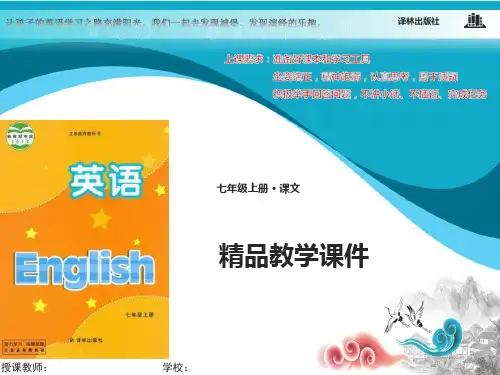
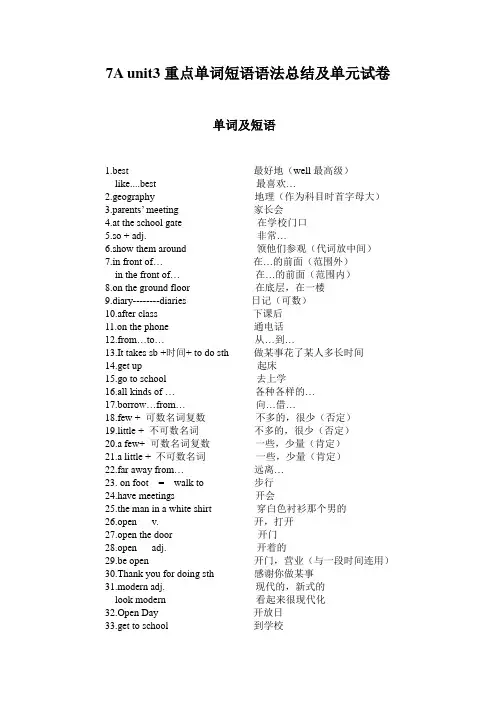
7A unit3重点单词短语语法总结及单元试卷单词及短语1.best 最好地(well最高级)like....best 最喜欢…2.geography 地理(作为科目时首字母大)3.parents’ meeting 家长会4.at the school gate 在学校门口5.so + adj. 非常…6.show them around 领他们参观(代词放中间)7.in front of… 在…的前面(范围外)in the front of… 在…的前面(范围内)8.on the ground floor 在底层,在一楼9.diary--------diaries 日记(可数)10.after class 下课后11.on the phone 通电话12.from…to… 从…到…13.It takes sb +时间+ to do sth 做某事花了某人多长时间14.get up 起床15.go to school 去上学16.all kinds of … 各种各样的…17.borrow…from… 向…借…18.few + 可数名词复数不多的,很少(否定)19.little + 不可数名词不多的,很少(否定)20.a few+ 可数名词复数一些,少量(肯定)21.a little + 不可数名词一些,少量(肯定)22.far away from… 远离…23. on foot = walk to 步行24.have meetings 开会25.the man in a white shirt 穿白色衬衫那个男的26.open v. 开,打开27.open the door 开门28.open adj. 开着的29.be open 开门,营业(与一段时间连用)30.Thank you for doing sth 感谢你做某事31.modern adj. 现代的,新式的look modern 看起来很现代化32.Open Day 开放日33.get to school 到学校语法人称代词1.人称代词是用来代替表示人和物的名词。
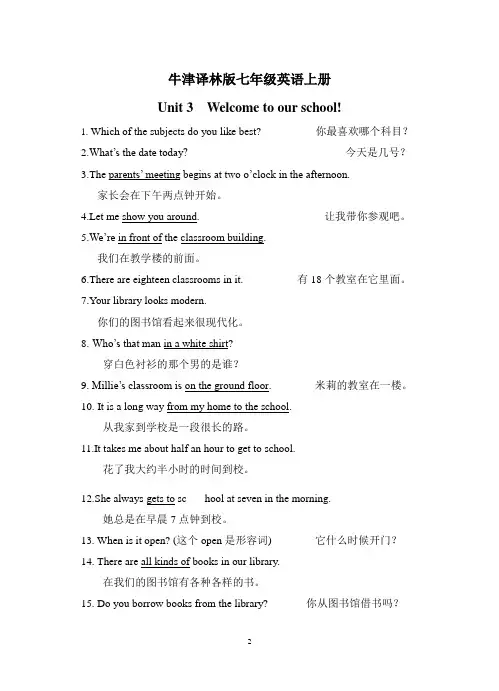
牛津译林版七年级英语上册Unit 3 Welcome to our school!1. Which of the subjects do you like best? 你最喜欢哪个科目?2.What’s the date today? 今天是几号?3.The parents’ meeting begins at two o’clock in the afternoon.家长会在下午两点钟开始。
4.Let me show you around. 让我带你参观吧。
5.We’re in front of the classroom building.我们在教学楼的前面。
6.There are eighteen classrooms in it. 有18个教室在它里面。
7.Your library looks modern.你们的图书馆看起来很现代化。
8.Who’s that man in a white shirt?穿白色衬衫的那个男的是谁?9. Millie’s classroom is on the ground floor. 米莉的教室在一楼。
10. It is a long way from my home to the school.从我家到学校是一段很长的路。
11.It takes me about half an hour to get to school.花了我大约半小时的时间到校。
12.She always gets to sc hool at seven in the morning.她总是在早晨7点钟到校。
13. When is it open? (这个open是形容词) 它什么时候开门?14. There are all kinds of books in our library.在我们的图书馆有各种各样的书。
15. Do you borrow books from the library? 你从图书馆借书吗?16. Thanks for your letter. 谢谢你的来信。
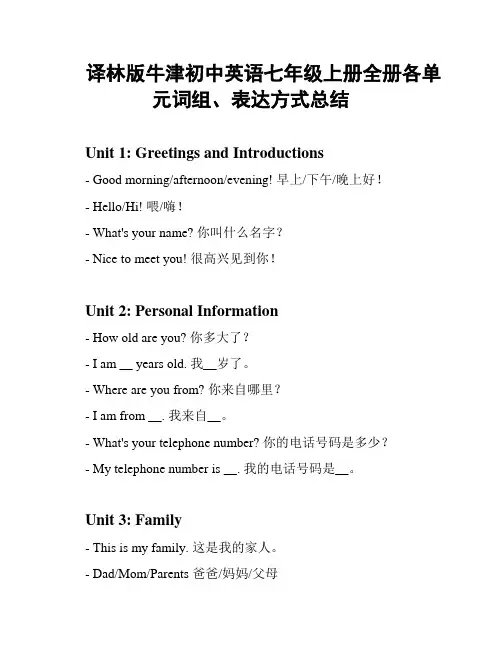
译林版牛津初中英语七年级上册全册各单元词组、表达方式总结Unit 1: Greetings and Introductions- Good morning/afternoon/evening! 早上/下午/晚上好!- Hello/Hi! 喂/嗨!- What's your name? 你叫什么名字?- Nice to meet you! 很高兴见到你!Unit 2: Personal Information- How old are you? 你多大了?- I am __ years old. 我__岁了。
- Where are you from? 你来自哪里?- I am from __. 我来自__。
- What's your telephone number? 你的电话号码是多少?- My telephone number is __. 我的电话号码是__。
Unit 3: Family- This is my family. 这是我的家人。
- Dad/Mom/Parents 爸爸/妈妈/父母- Brother/Sister 兄弟/姐妹- I have __ siblings. 我有__个兄弟姐妹。
- Who is this? 这是谁?Unit 4: School Life- I go to school by __. 我通过__去上学。
- My favorite subject is __. 我最喜欢的科目是__。
- We have __ classes every day. 我们每天有__节课。
- What time do you go to school? 你几点去上学?- I go to school at __. 我__去上学。
Unit 5: Daily Routine- I get up at __. 我__起床。
- I brush my teeth. 我刷牙。
- I have breakfast/lunch/dinner. 我吃早饭/午饭/晚饭。
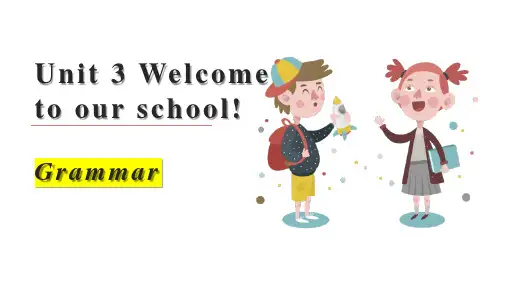
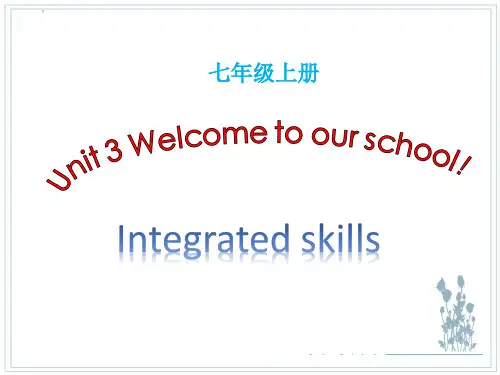
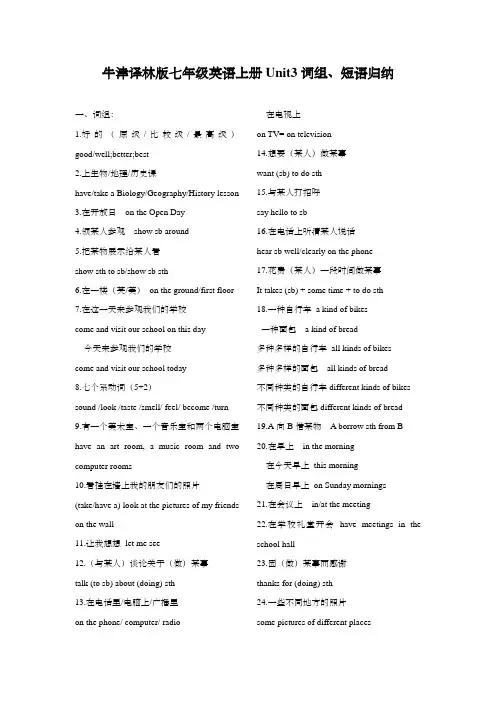
牛津译林版七年级英语上册Unit3词组、短语归纳一、词组:1.好的(原级/比较级/最高级)good/well;better;best2.上生物/地理/历史课have/take a Biology/Geography/History lesson3.在开放日on the Open Day4.领某人参观show sb around5.把某物展示给某人看show sth to sb/show sb sth6.在一楼(英/美)on the ground/first floor7.在这一天来参观我们的学校come and visit our school on this day今天来参观我们的学校come and visit our school today8.七个系动词(5+2)sound /look /taste /smell/ feel/ become /turn 9.有一个美术室、一个音乐室和两个电脑室have an art room, a music room and two computer rooms10.看挂在墙上我的朋友们的照片(take/have a) look at the pictures of my friends on the wall11.让我想想let me see12.(与某人)谈论关于(做)某事talk (to sb) about (doing) sth13.在电话里/电脑上/广播里on the phone/ computer/ radio在电视上on TV= on television14.想要(某人)做某事want (sb) to do sth15.与某人打招呼say hello to sb16.在电话上听清某人说话hear sb well/clearly on the phone17.花费(某人)一段时间做某事It takes (sb) + some time + to do sth18.一种自行车a kind of bikes一种面包 a kind of bread多种多样的自行车all kinds of bikes多种多样的面包all kinds of bread不同种类的自行车different kinds of bikes 不同种类的面包different kinds of bread19.A向B借某物 A borrow sth from B20.在早上in the morning在今天早上this morning在周日早上on Sunday mornings21.在会议上in/at the meeting22.在学校礼堂开会have meetings in the school hall23.因(做)某事而感谢thanks for (doing) sth24.一些不同地方的照片some pictures of different places25.一切顺利all the best26.来这边come here去那边go there课后在那边玩play there after school二、句子:1.你最喜欢的科目是什么?(四种)1) Which/ What is your favourite subject?2) Which of the subjects do you like best?3) Which/What subject do you like best?4) Which/ What subject is your favourite?2.今天是几月几号?今天是10月7日。
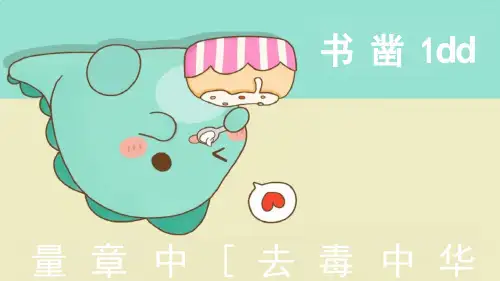
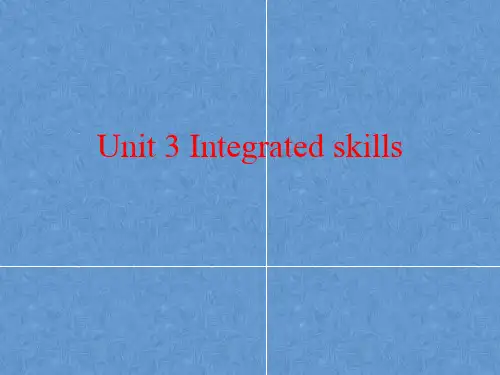
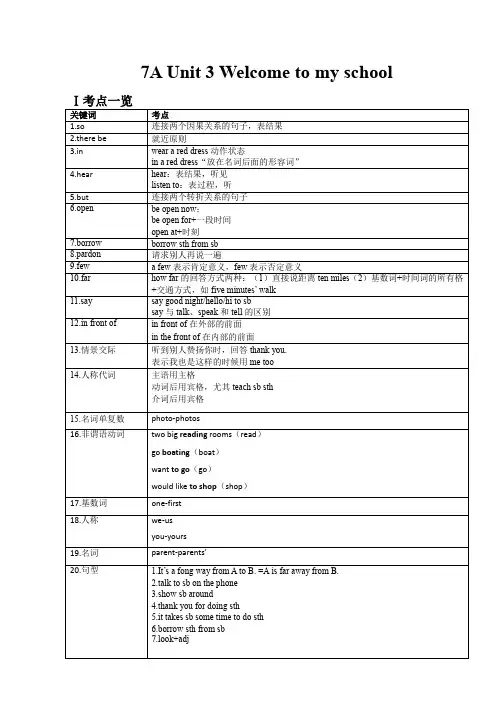
7A Unit 3 Welcome to my schoolⅡ考点讲解1.I have two cakes, and you have one. So I can eat three.(1)so的基本含义作连词,意思为因此,所以(2)so的核心考点连接两个句子,这两个句子是因果关系,so引导出结果那句,但不能与because同时出现。
【2020年九中】1.Breakfast helps us start the day well, ______ we should remember to eat something before going to school in the morning.A.becauseB. butC. soD.or答案C2.There are 18 classrooms in the school building.(1)there be句型的基本含义表示在某地或某时有某物(2)there be句型的核心考点考察there be句型的就近原则【2020年钟英】2.There________a big garden and many buildings near our school.A. hasB. areC. haveD. is答案D【2020年建邺】3.--- Look! There_____an English book and two exercise books on the desk.--- Yes. They are Kitty’s.A. haveB. areC. beD. is答案D3.Who’s the man in a white shirt.(1)in的基本含义作介词,意思是穿着(2)in的核心考点考察wear a red dress和in a red dress的区别。
如果做谓语,用wear a red dress,意思为穿红色裙子;如果做定语,如the +girl/woman+in a red dress,意思是穿红色裙子的女孩/女人。
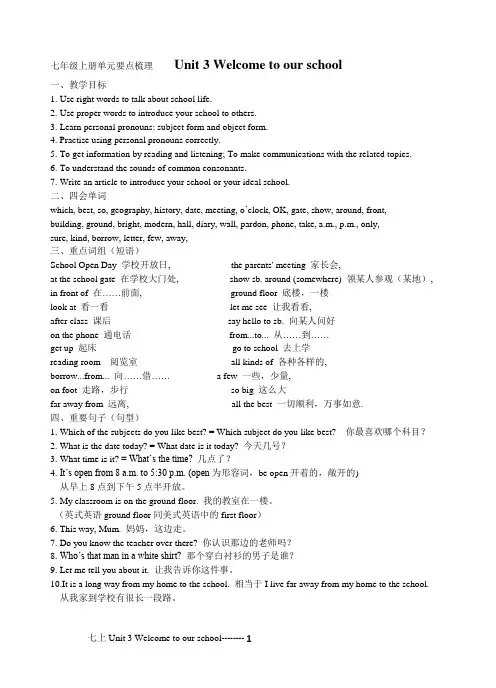
七年级上册单元要点梳理Unit 3 Welcome to our school一、教学目标1. Use right words to talk about school life.2. Use proper words to introduce your school to others.3. Learn personal pronouns: subject form and object form.4. Practise using personal pronouns correctly.5. To get information by reading and listening; To make communications with the related topics.6. To understand the sounds of common consonants.7. Write an article to introduce your school or your ideal school.二、四会单词which, best, so, geography, history, date, meeting, o’clock, OK, gate, show, around, front, building, ground, bright, modern, hall, diary, wall, pardon, phone, take, a.m., p.m., only,sure, kind, borrow, letter, few, away,三、重点词组(短语)School Open Day 学校开放日, the parents' meeting 家长会,at the school gate 在学校大门处, show sb. around (somewhere) 领某人参观(某地), in front of 在……前面, ground floor 底楼,一楼look at 看一看let me see 让我看看,after class 课后say hello to sb. 向某人问好on the phone 通电话from...to... 从……到……get up 起床go to school 去上学reading room 阅览室all kinds of 各种各样的,borrow...from... 向……借…… a few 一些,少量,on foot 走路,步行so big 这么大far away from 远离, all the best 一切顺利,万事如意.四、重要句子(句型)1. Which of the subjects do you like best? = Which subject do you like best? 你最喜欢哪个科目?2. What is the date today? = What date is it today? 今天几号?3. What time is it? = What’s the time? 几点了?4. It’s open from 8 a.m. to 5:30 p.m. (open为形容词,be open开着的,敞开的)从早上8点到下午5点半开放。
译林版牛津初中英语七年级上册全册各单元短语、句型归纳整理Unit 1 This is me!短语:1.look after sb. 照顾某人2.some of the new students 新学生中的一些one of + 可数名词复数…..中的一个many of + 可数名词复数…..中的许多much of + 不可数名词…..中的许多3.love doing…. 热爱/喜爱做….like doing….喜爱做….enjoy doing…. 喜欢/享受做…4.let sb. do sth. 让某人做某事5.make sb. do sth. 使某人做某事使役动词let, make后面接省to的动词不定式充当宾语补足语、6 like sports 喜爱运动7 after class 课后in class 在课上8. be good at (doing)…… 擅长(做)某事=do well in (doing)……9.meet my new friends 见见我的新同班同学10.over there 在那边11. tell sb. about sth. 告诉某人关于某事12. Oh, I see. 哦,我明白了。
13. wear glasses 戴着眼镜14. like all the lessons 喜欢所有的功课15. need作为行为动词的用法:need to do don’t / doesn’t need to do16.twelve years old 12岁17. 17.be\come from 来自于句型:1.How to look after your e-dog.如何照顾你的电子狗。
2.I have short hair. = My hair is short. 我短发。
3.Let’s meet my new classmates. 让我们见见我的新同学。
4. She is tall and slim. 她高而苗条。
Unit 3 Topic1 1 English is widely spoken throughout the world. 一. 重点单词 foreign — foreigner busy—business—businessman communicate—communication impossible—possible twin—twins lay—laid—laid speak—speaker Europe—European tour—tourist—tourism power--powerful lead—leading--leader 二·词组。 stick sth on sp. 把。。。贴在 be ready for sth 为某事准备好了 can’t wait to do sth 迫不及待做某事 have a good chance to do sth 有一个好的机会去做某事 throughout / all over the world 全世界 from now on 从现在开始 millions of 数以百万计的 be pleased with 对。。感到满意 pack one’s bags 打包行李 on business 出差 the night table 床头柜 the official language 官方语言 be similar to / be the same as / be different from
和。。。相似 和。。。一样 和。。。不一样 have trouble/difficulty (in) doing sth 做某事有困难 ask sb for help 向某人求助 explain (sth) to sb 向某人解释某事 get along with sb 与某人相处 be in trouble 处于麻烦中 divide into… 把。。。分成 the largest number of people 最多数量的人 mother tongue 母语 the base language 基础语言 international business 国际商业 the world’s airlines 国际航空 in many different fields of life 在生活的很多不同领域 go abroad 出国 play an important part in our lives 在我们生活中扮演重要角色 a powerful country 一个强大的国家 take the leading position in 在某方面处于领先地位 encourage sb to do sth 鼓励某人做某事 be popular with sb. 受某人的欢迎 make great progress in doing sth 在某事上取得巨大的进步 require sb to do sth 要求某人做某事 in the rest of 在。。。的剩余部分 regard…as… 把。。。当做。。。 三.重点句子。 1.I will be able to see more cartoon characters。 我将能够去看更多的卡通人物。 2.I can’t wait to fly there. 我迫不及待想飞去那里。 3.You’ll have a good chance to practice your English there. 你将有一个好机会去练习你的英语。 4.Try your best and work much harder from now on. 尽你所能从现在开始更加努力的学习。 5.Is it possible for you to have trouble communicating? 你有可能在交流上有困难吗? 6.I don’t think I will have any long conversations in Spanish. 我认为我将不会用西班牙语进行长对话。 7.I wish you success. 我祝你成功 8.There are more than 3000 languages spoken in the world. 全世界有超过 3 千种语言被使用 9.Disneyland is enjoyed by millions of people from all over the world. 世界上数以百万的人们都喜欢迪斯尼乐园。 10.English is spoken as the main language in America. 英语在美国作为第一
语言来说。 11.English is widely used throughout the world now. 英语在全世界被广泛使用。 12.Now, students are required to learn English. 现在学生们被要求学习英语。 13.The study of English is regarded as a very important industry in China as well as in the rest of the world. 英语的学习在中国和世界的其他国家都被当做一个非常重要的产业。 四.语法 英语动词有两种语态.,主动语态和被动语态。 主动语态表示主语是动作的执行者,被动语态表示主语是动作的承受者。如: They will build a new bridge over the river. (主动) A new bridge will be built over the river. (被动) 汉语中常用“被”、“给”、“由”、“受”等词用来表示被动,而英语用:助动词 be + 及物动词的过去分词构成+(by+ 动作的执行者)。be 有人称,数和时态的变化,其肯定式,否定式和疑问式的变化规则与 be 作为系动词时完全一样。如: English is widely used around the world English is not widely used around the world. Is English widely used around the world? Yes, it is. No, it isn’t. 被动语态的构成为“be + 过去分词”。在不同的时态中,过去分词保持不变,而 be 动词随着时态有不同的变化,如:am/ is/ are(一般现在时);was/ were (一般过去时);have/ has been( 现在完成时);am/ is/are being (现在进行时)等。若含有情态动词,则用“情态动词+ be + 过去分词”结构。 The flowers are being watered by them. 他们正在浇花。The plan has been found by me. 钢笔已经被我找到了。Homework must be finished first. 必须要先完成作业。 练习题 ( )1._____ a new library in our school last year? A. Is; built B. Was; built C. Does; build D. Did ; build ( )2. An accident on this road last week. A. has been happened B. was happened C. is happened D. happened ( )3.Cotton(棉花) in the southeast of China. A. is grown B. are grown C. grows D. grow ( )4.So far, the moon by man already. A. is visited B. will be visited C. has been visited D. was visited ( )5.A talk on Chinese history in the school hall next week. A. is given B. has been given C. will be given D. gives ( )6.--When ___ this kind of computers______? --Last year. A. did; use B. was; used C. is; used D. are; used
Unit 3 Topic2 Some things usually have different meanings in different cultures. 归纳:任若冰老师 一. 重点词组归纳 see sb. off 为某人送行
on one’s way to… 在某人去。。。的路上 put out his hand with his thumb raised 竖起拇指伸出他的手ask for a ride 请求搭便车 give sb. a ride 让某人搭便车 get on (the bus) 上车 pick sb. up 开车接某人 in several minutes 在几分钟之内/之后 give sb. a speech 给某人做个演讲 as a sign of… 作为。。。的标志/表示。。。 a dog catching a mouse 狗捉耗子多管闲事 be known/famous as… 作为。。。而著名 be known/famous for… 因。。。而著名 be known to sb. 被。。。所熟知 even if 即使 do some research 做些调查研究 stamp one’s foot 跺脚 have a victory 取得胜利 hold hands 握手 avoid doing sth. 避免做某事 be considered as…= be regarded as… 被看作。。。 be considered (to be)… 被认为。。。 at times 有时 compare A to B 把 A 比作 B compare A with B 把 A 和 B 做比较 pay attention to… 注意。。。 in the past few centuries 在过去的几个世纪里 even worse 更糟糕 write back to sb. 给某人回信 二. 重点句型 I can’t believe that I’m flying to Disneyland. 我都不敢相信我就要飞往迪斯尼乐园。 Michael sees a stranger putting out his hand with his thumb raised. Michael 看到一个陌生人正竖起拇指地伸出他的手。 with his thumb raised with 结构作伴随状语 Eg. The teacher came in with a cup in his hand. The thief stood there with his arms tied behind his back. My uncle is meeting us tomorrow. 我的叔叔明天要来接我们。 No need to worry. = There is no need to worry. 没有必要担心。